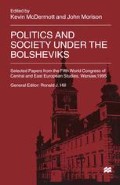Abstract
Support for the political platform of the Bolsheviks among Petrograd factory workers facilitated the party’s seizure of power in October 1917, and helped it to overcome the threat posed by a hostile Constituent Assembly in January 1918. However, even at the time of the dispersion of the Constituent Assembly, several factors that were soon to erode the standing of the Bolsheviks among Petrograd workers had begun to emerge. These factors included the frustration of hopes of an immediate compromise peace, the shutdown of factories engaged in military production (resulting in massive unemployment),1 chaotic evacuation policies, and most important, ever more dire food shortages. These developments, in turn, led in short order to worker protests, which then precipitated violent repressions against hostile workers. Such treatment further intensified the disenchantment of significant segments of Petrograd labour with Bolshevik-dominated Soviet rule. For the Soviet authorities in Petrograd, the rise of the Extraordinary Assembly of Delegates from Petrograd Factories and Plants was an ominous portent of worker defection.
Access this chapter
Tax calculation will be finalised at checkout
Purchases are for personal use only
Preview
Unable to display preview. Download preview PDF.
Notes
Referring to initial meetings of the Assembly as early as January 1918, N.B. Bogdanova has probably confused the Assembly with meetings of factory representatives convened by the Union for the Defence of the Constituent Assembly: see N.B. Bogdanova, Moi otets men’shevik (St. Petersburg, 1994), p. 64.
G.A. Aronson, Dvizhenie upolnomochennykh fabrik i zavodov v 1918 godu (New York, 1960). Aronson’s memoir was originally written in Paris in 1938.
TsGA SPb, f. 3390, op. 1, d. 13, 1. 2. Although prominent moderate socialist party officials, especially Mensheviks, helped to initiate the Assembly movement in the first place, Vladimir Brovkin exaggerates their leadership role thereafter: see Vladimir N. Brovkin, The Mensheviks After October: Socialist Opposition and the Rise of the Bolshevik Dictatorship (Ithaca, NY, and London, 1987 ), p. 174.
Editor information
Editors and Affiliations
Copyright information
© 1999 Palgrave Macmillan, a division of Macmillan Publishers Limited
About this chapter
Cite this chapter
Rabinowitch, A. (1999). Early Disenchantment with Bolshevik Rule. In: McDermott, K., Morison, J. (eds) Politics and Society under the Bolsheviks. International Council for Central and East European Studies. Palgrave Macmillan, London. https://doi.org/10.1007/978-1-349-27717-9_3
Download citation
DOI: https://doi.org/10.1007/978-1-349-27717-9_3
Publisher Name: Palgrave Macmillan, London
Print ISBN: 978-1-349-27719-3
Online ISBN: 978-1-349-27717-9
eBook Packages: Palgrave History CollectionHistory (R0)

